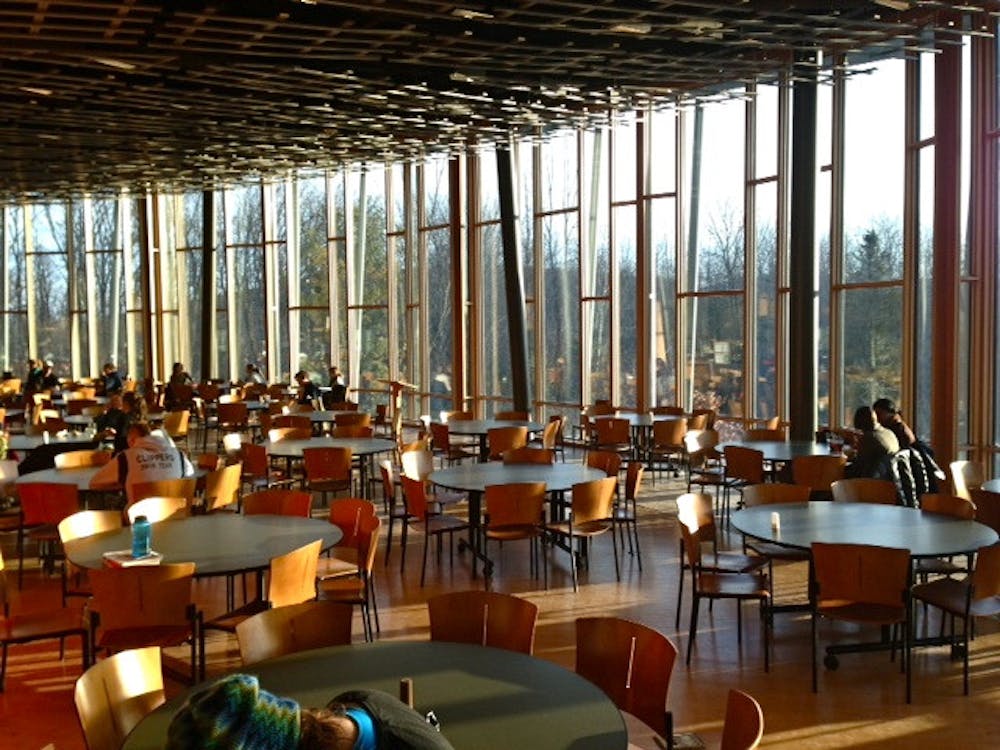The implementation of a swipe system in all three of the college’s dining halls has resulted in more than $300, 000 in savings since last September, according to David Provost, the college’s treasurer.
That figure, comprised of savings through February of this year, includes $100,000 in revenue made through selling individual meals to visitors and off-campus students, as well as specialized plans to faculty and staff. It also reflects a reduction in food costs, which are a byproduct of now having accurate data to show the number of students who actually eat at the dining halls during a given day.
As reported in The Campus last fall, one of the major reasons for implementing the swipe system was to ensure people did not enter the dining halls and eat for free. Visiting sports teams and students who lived off-campus and opted not to pay for a meal plan were large abusers of the former system, but the college has been able to capitalize on those losses since implementing the swipe system. Now, those not on meals plans pay when they want to eat in the dining hall.
“For example, UVM track just tried to get into the dining hall a couple months ago, so now we capture those people who come into the dining halls, so it’s actually increased our revenue quite a bit. It’s not that we turn those people away, but we hold them accountable and make them pay,” said Dan Detora, who heads food operations for the college.
Though in other areas the college is cutting costs in order to decrease deficits, the savings and revenue that have come with the implementation of the swipe system have been reinvested back into the college’s dining system, resulting in a net savings of around $3,000.
“In the old plan of not having swipe cards, we were feeding a lot of people who weren’t paying, and students were paying for that,” said Provost, who emphasized that money will now go back to the students, instead of the other way around. “Because we’re trying to take the savings from dining and invest them back into dining, it won’t have a big impact on deficit reduction.”
This revenue has been reinvested into dining services in a number of ways. More grass-fed beef, dairy free and vegan options have been introduced. Upon request from the Student Government Association, Nutella is now available in dining halls, which costs $20,000 per year. Each student has also received $25 in declining balance per semester, which they can then use at on-campus vendors such as the Grille and Crossroads Café.
When the swipe system was first announced, it was met with widespread skepticism from the student body. However, since then, it has become widely accepted. Provost acknowledged students’ initial resentment toward the swipe system and said the college needed to do a better job in announcing new changes in the future. “We have to find a way to communicate better so that the hysteria goes away,” he said.
In the near future, there is no plan to offer meal plans other than unlimited. But, dining services is working to expand retail food services on campus and will examine offering multiple meal plans in the future, should students approve.
Detora said that Starbucks coffee will be sold in Wilson Cafe by next fall, and he is currently working on plans to expand food offerings in the athletic center beyond game-time concessions.
Provost said improving the McCullough Student Center is also a focus area for him in the future.
“I would like to see us make McCullough more of a student center, I don’t believe it reflects what most student centers on college campuses look like,” he said. Detora said the college is already having architects coming to look at The Grille and find ways to improve the space.
There is also the potential of creating a new student store. In light of the bookstore’s recent decision to no longer sells books, the store could find its way to McCullough and merge with MiddExpress. “Isn’t there a student store experience in the student center that can meet all those needs?” Provost asked.
With additional retail spaces, Detora and Provost expect that students will want different meal plan options.
“As we build those retail spaces, students might want to consider less meals in the dining hall and more declining balance on their card,” Detora said. “That will definitely be a student decision. We have a food committee and students will decide that, [along with] the SGA.”
“As these retail units grow, we’ll see what happens, but as of right now, there’s no plan of changing the meal plan for next year,” he added.
Dining services will cut costs further after spring break, when reusable to-go containers replace disposable ones. In a school-wide email, Detora explained that dining services purchases more than 180,000 to-go containers per year, costing more than $27,000. The SGA worked with dining services to develop this plan.
Beginning April 9, the dining halls will no longer have disposable to-go boxes. Instead, students now have the option to participate in a new reusable to-go program until the end of the spring semester. Students can provide feedback at go.middlebury.edu/to-go.
“After this time, dining will assess the program to improve it,” Detora wrote. “We are so excited to implement this project and hope you will be a part of it!”
Swipe System Saves College Dining More than $300K

Comments



